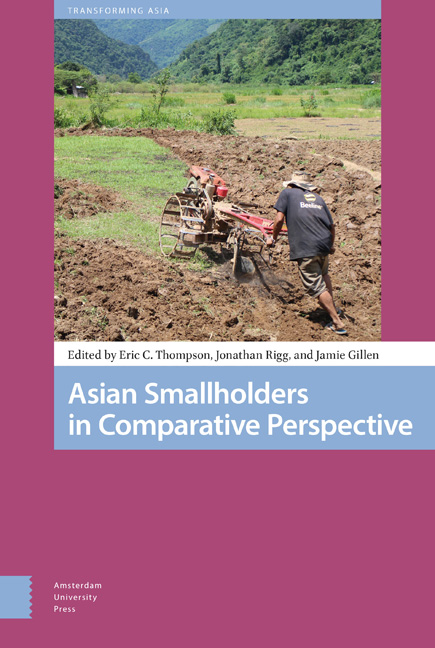Book contents
- Frontmatter
- Contents
- List of Maps, Figures and Tables
- Preface
- Introduction: Asian Smallholders in Comparative Perspective
- 1 Cambodia: Political Strife and Problematic Land Tenure
- 2 Indonesia: Whither Involution, Demographics, and Development?
- 3 Japan: Government Interventions and Part-time Family Farming
- 4 Laos: Responding to Pressures and Opportunities
- 5 Malaysia: The State of/in Village Agriculture
- 6 The Philippines: Fragmented Agriculture , Aquaculture, and Vulnerable Livelihoods
- 7 Singapore: Making Space for Farming
- 8 Taiwan: Toward the Revitalization of Smallholder Agriculture
- 9 Thailand: The Political Economy of Post-Peasant Agriculture
- 10 Vietnam: From Socialist Transformation to Reform
- Index
1 - Cambodia: Political Strife and Problematic Land Tenure
Published online by Cambridge University Press: 21 November 2020
- Frontmatter
- Contents
- List of Maps, Figures and Tables
- Preface
- Introduction: Asian Smallholders in Comparative Perspective
- 1 Cambodia: Political Strife and Problematic Land Tenure
- 2 Indonesia: Whither Involution, Demographics, and Development?
- 3 Japan: Government Interventions and Part-time Family Farming
- 4 Laos: Responding to Pressures and Opportunities
- 5 Malaysia: The State of/in Village Agriculture
- 6 The Philippines: Fragmented Agriculture , Aquaculture, and Vulnerable Livelihoods
- 7 Singapore: Making Space for Farming
- 8 Taiwan: Toward the Revitalization of Smallholder Agriculture
- 9 Thailand: The Political Economy of Post-Peasant Agriculture
- 10 Vietnam: From Socialist Transformation to Reform
- Index
Summary
Abstract
Small landholding is a defining feature of Cambodian farmers and represents the ways of life of the majority of Cambodians. Despite rapid urbanization, a large majority of Cambodians remain living in rural areas and most of them are smallholders. Socially and historically Cambodian smallholders were ‘a class in themselves’ and their cultural significance has been relevant to recent Cambodian social and political lives. Today Cambodian smallholders play a critical role in the country's economy but are faced with issues that threaten their ways of life, from national politics and policies to regional economic dynamics and climate change. While smallholding remains economically and politically crucial for Cambodia, the next generation of Cambodian smallholders may find their smallholding future uncertain.
Keywords: agriculture, Cambodia, farmers, rice, smallholdings, youth
Despite rapid urbanization in recent years, Cambodia remains largely an agrarian country. An overwhelming majority of the population (78%) still lives in rural areas, and agriculture makes up 31% of the country’s GDP (Ministry of Agriculture, Forestry and Fisheries [MAFF] 2015) and employs 80% of the national labour force (National Institute of Statistics [NIS] 2013). The country's major agricultural commodity is rice, or ang-kor in Khmer, which also largely constitutes the identity and way of life for Cambodians. Other major crops include cassava, maize, mung bean, and soybean. Rice is grown for both household consumption and trade, but other crops are grown mostly for commercial purposes and exports, mainly to Thailand, Vietnam, and, to a lesser extent, China. Given that 70% of agricultural landholding is used for rice farming, this chapter will focus mainly on rice smallholders more than on farmers of other agricultural crops and activities.
Small landholding is a defining feature of Cambodian farmers. While the Food and Agriculture Organization (FAO) defines those with 2 hectares or less of land ownership as smallholders, there is no existing figure on Cambodian farmers with 2 hectares or less of land. A newly released report on agricultural census conducted by the National Institute of Statistics (NIS) and other international development partners contains only figures of agricultural landholding of less than 1 hectare (47%), 1 to 3.99 hectares (45%), 4 to 9.99 hectares (7%), and 10 or more (1%) (NIS 2013).
- Type
- Chapter
- Information
- Asian Smallholders in Comparative Perspective , pp. 39 - 56Publisher: Amsterdam University PressPrint publication year: 2019



